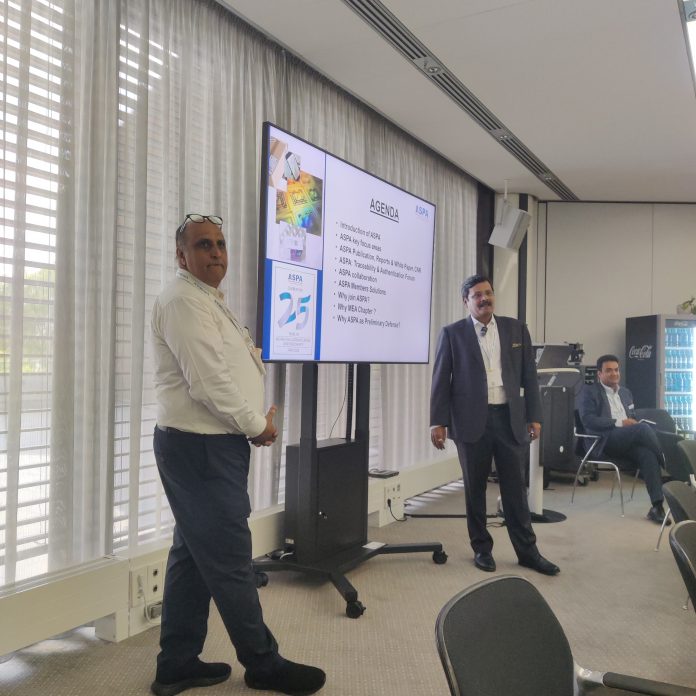The Authentication Solution Providers’ Association (ASPA), a non-profit organization dedicated to advancing secure authentication solutions, has announced its expansion into the Middle East and Africa regions with the introduction of its MEA (Middle East & Africa) Chapter. The announcement was made at a drupa 2024 event, which saw the participation of more than 40 delegates from Latin America, Europe, the Middle East, Africa, and India. The event was attended by stakeholders in the authentication industry worldwide.
The new Middle East and Africa chapter will be headed by Ranesh Bajaj, who will be the chairperson. “We are using this opportunity to launch the Middle East chapter for ASPA because we are now thinking of going global, going beyond our immediate domain of India. And we have Ranesh Bajaj and team who will take up that initiative,” said Manoj Kochar, president of ASPA.
Kochar emphasized the importance of combating counterfeiting at the source to ensure the integrity of exported goods and protect global supply chains. “By working collaboratively with stakeholders around the world, we can implement effective authentication measures, strengthen regulatory frameworks, and raise awareness among consumers, ultimately contributing to global economic growth and consumer confidence. Counterfeiting is a transnational threat that requires coordinated and collaborative efforts from stakeholders across borders,” he stated.
Recognizing the Middle East and Africa as significant export hubs for various products, including pharmaceuticals, automotive parts, electronics, and luxury goods, ASPA acknowledged the critical importance of addressing counterfeiting issues before these products enter international supply chains. According to a recent report by the Organization for Economic Co-operation and Development (OECD), counterfeit goods account for up to 3.3% of global trade, with the Middle East and Africa contributing significantly to this challenge.
Kochar highlighted ASPA’s commitment to working with any organization that raises awareness against counterfeiting and promotes authentication solutions. “We are always happy to lend a hand. We do a lot of advocacy with industry partnerships. We connect with ministries, industry chambers, and various industry players. Any company that wants to lend its voice and give us opportunities to talk to the government and other stakeholders, we’re happy to have them,” he said.
ASPA collaborates with international associations in similar fields, such as the International Hologram Manufacturers Association (IHMA) and the International Tax Stamp Association (ITSA).
“I am eager to lead ASPA’s efforts in the Middle East and Africa,” Bajaj said. “We will remain steadfast in upholding ASPA’s core values and mission, working tirelessly to promote authentication solutions and protect consumers in these regions. Additionally, we aim to gather more like-minded stakeholders to join us in this collective endeavor.”
Bajaj added, “It’s time for an Indian-led organization to become global and have members around the world. Counterfeiting is a global menace. We can take the learnings that we have in India to the global market. We are starting with a review in Kenya and look forward to adding members from Kenya. We will soon have members in Brazil. We want to have a global footprint.”
Founded in 1998, ASPA works to raise awareness about the importance of authentication solutions for brand, document, revenue protection, and consumer empowerment. The organization strives to educate stakeholders, including government authorities, brand owners, industry professionals, and consumers, on the benefits of combining technology solutions to ensure product authenticity. ASPA also aims to inform companies on how adopting physical and digital authentication and traceability solutions can facilitate brand protection and reduce revenue loss.










